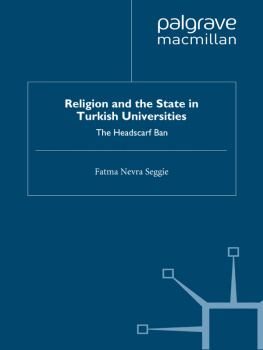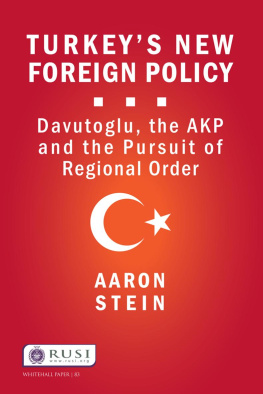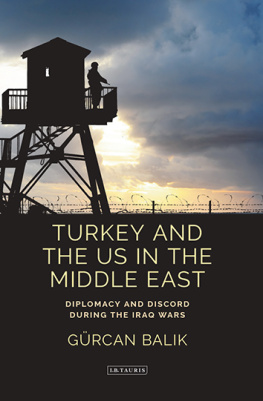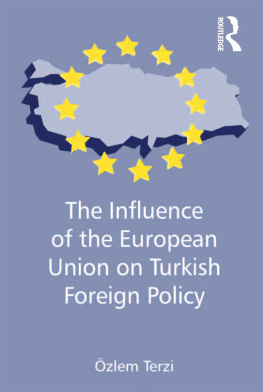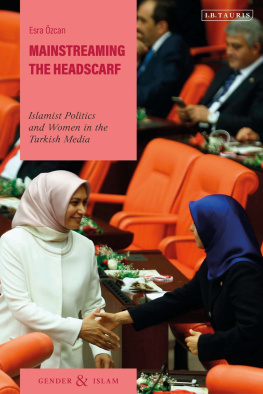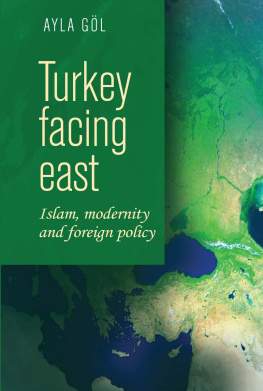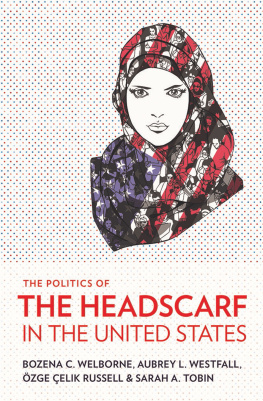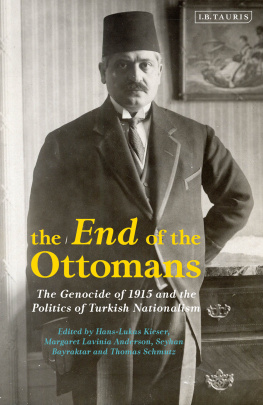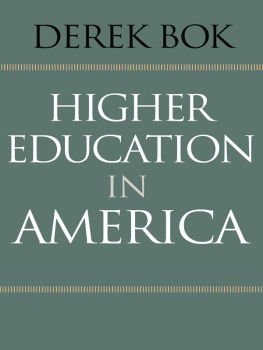Religion and the State in Turkish Universities
Middle East Today
Series editors:
Mohammed Ayoob
University Distinguished Professor of International Relations
Michigan State University
Fawaz A. Gerges
Professor and Chair of Middle Eastern
Politics and International Relations
Director of the Middle East Centre
London School of Economics
The Iranian Revolution of 1979 and the subsequent Gulf Wars, along with the overthrow of the Iraqi President Saddam Hussein, have dramatically altered the geopolitical landscape of the contemporary Middle East. This series puts forward a critical body of first-rate scholarship that reflects the current political and social realities of the region, focusing on original research about the Israeli-Palestine conflict; social movements, institutions, and the role played by nongovernmental organizations such as Hamas, Hezbollah, the Taliban, and the Muslim Brotherhood; Iran and Turkey as emerging preeminent powers in the regionthe former an Islamic republic and the latter a democracy currently governed by a party with Islamic roots; the oil producing countries in the Persian Gulf and their petrol economies; potential problems of nuclear proliferation in the region; and the challenges confronting the United States, Europe, and the United Nations in the greater Middle East. The focus of the series is on general topics such as social turmoil, war and revolution, occupation, radicalism, democracy, and Islam as a political force in the context of modern Middle East history.
Religion and the State in Turkish Universities: The Headscarf Ban
Fatma Nevra Seggie
Religion and the State in
Turkish Universities
The Headscarf Ban
Fatma Nevra Seggie


RELIGION AND THE STATE IN TURKISH UNIVERSITIES
Copyright Fatma Nevra Seggie, 2011.
All rights reserved.
First published in 2011 by
PALGRAVE MACMILLAN
in the United Statesa division of St. Martins Press LLC,
175 Fifth Avenue, New York, NY 10010.
Where this book is distributed in the UK, Europe and the rest of the World, this is by Palgrave Macmillan, a division of Macmillan Publishers Limited, registered in England, company number 785998, of Houndmills, Basingstoke, Hampshire RG21 6XS.
Palgrave Macmillan is the global academic imprint of the above companies and has companies and representatives throughout the world.
Palgrave and Macmillan are registered trademarks in the United States, the United Kingdom, Europe and other countries.
ISBN: 9780230110373
Library of Congress Cataloging-in-Publication Data
Seggie, Fatma Nevra.
Religion and the state in Turkish universities : the headscarf ban / Fatma Nevra Seggie.
p. cm. (Middle East today)
ISBN 9780230110373
1. Education and stateTurkey. 2. Religion and stateTurkey. 3. Universities and collegesTurkey. 4. Islamic educationTurkey. 5. Hijab (Islamic clothing)Turkey. I. Title. II. Series.
LC94.T9S44 2010
379.2 809561dc22
2010035159
A catalogue record of the book is available from the British Library
Design by Integra Software Services
First edition: May 2011
10 9 8 7 6 5 4 3 2 1
Printed in the United States of America.
This book is dedicated to the two women who helped me
become who I am today:
My grandmother,
Mzehher Sargut
and
My mother,
Aliye Belks Ergin
List of Tables
Foreword
Ann E. Austin
Dr. Fatma Nevra Seggie has written a book that gives readers across nations and cultures greater understanding about higher education, the lives of a particular group of women, and the intersection of religion and public policy. This book began as Dr. Seggies dissertation in the Higher, Adult, and Lifelong Education program at Michigan State University, where I had the pleasure of serving as her advisor. I can attest to the careful thought and probing questions that led her to the topic, the sensitive approach she took to the research she conducted in her home country of Turkey, her diligence in analyzing and interpreting the results, and, ultimately, her continuing commitment as she developed her study into this book. In a world where religion plays an important role in individual lives, national contexts, and international developments, Dr. Seggies work deepens in important ways our awareness and appreciation for the ways in which national policies and personal experiences pertaining to religious practice interact within higher education institutions.
While each reader will find specific aspects of the study of interest, I highlight three thematic areas in which the book makes important contributions. The primary focus of the book is on the experiences of covered women in Turkey who must unveil to pursue their academic degrees as a result of the higher education headscarf ban policy. Second, the book highlights the kinds of issues that emerge when public policy, higher education, and religion interact, and the complex, sometimes unexpected, outcomes of public policies. Third, Dr. Seggies work sheds light on issues that emerge in the process of doing qualitative research, especially pertaining to sensitive issues in the lives of individuals and nations.
As she explains early in the volume, Fatma Nevra Seggie was inspired to study the experiences of covered women who unveil in order to pursue higher education in order to understand the other, in this case, women who share her Turkish citizenship but whose experiences by virtue of their specific religious commitment and background are quite different from hers. She sought out covered women who would talk with her about the decision making in which they engaged to reach the point of unveiling, and the impact of unveiling on their educational experiences and identities as Muslim women, Turkish citizens, and females. The narratives she provides of five women as well as the extensive quotations from the larger group she interviewed open to readers many aspects of the lives, thoughts, and dilemmas facing these women. We learn that, in deciding to unveil, they grapple with family pressures (in some cases, strong encouragement to unveil, and, in other cases, resistance to unveiling) and are motivated by the promise of preparing themselves to enrich their family lives, to educate their children, and to contribute as talented, competent women to their country. Some also believe that unveiling in order to pursue higher education is a political step toward advancing and supporting the overall situation of covered women in their country.
We learn also, often poignantly, about how they experience unveiling in order to pursue their education. We learn that many of the participants in the study feel different from other students, sometimes fearful and unsafe, and often less confident than they would like. The students are diverse in the strategies that they employ to help them handle unveiling as the necessary route to participation in higher education. Some spend as little time on campus as possible, skipping classes when faculty members are insensitive to their situations, choosing electives on the basis of the reputations of faculty members for tolerance, eschewing extracurricular activities, and refraining from unnecessary conversation with other students or faculty members. The research particularly probes what the women believe is the impact of unveiling on their identities as Muslims, Turkish citizens, and women. Some feel they are giving up some of their Muslimness, while others find their religious commitment as Muslims deepens, even as they recognize that they are trading strict adherence to religious expectations for the opportunity to study and learn. In terms of their identity as Turkish citizens, some of the women indicate that the unveiling policy makes them feel like second-class citizens, while others have become more involved politically in response to the policy. In regard to the impact on their identity as women, some report feeling naked and discriminated against. In contrast to those who try to become as invisible as possible, some of the women report an assertive reaction, becoming even more motivated and ambitious in response to barriers to their educational process. Reactions and coping strategies vary depending on the personalities, choices, and circumstances of each particular woman.
Next page
